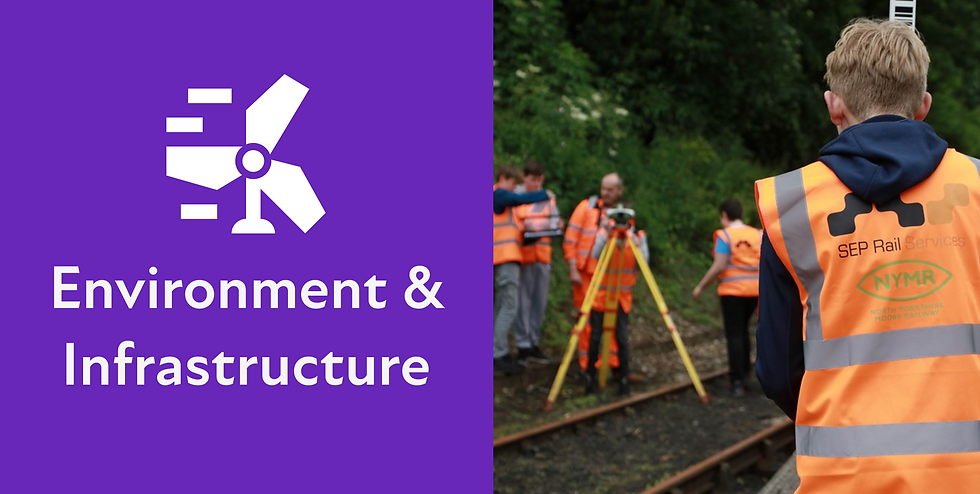Discover the World of Environment & Infrastructure Careers
- Career blog

- Jul 30, 2025
- 6 min read
Updated: Nov 25, 2025
Thinking about a career in Environment and Infrastructure? Whether you’re drawn to renewable energy, civil engineering, water networks or environmental management, this sector offers exciting and meaningful opportunities for young people keen to make an impact.
In this guide we’ll explore what careers in Environment and Infrastructure involve, the important skills employers are looking for, realistic salary ranges, and how to begin your journey – through work experience, training and pathway options via Futures For All.

What Are Environment and Infrastructure Careers?
The terms environment and infrastructure cover a broad but connected field of work – from designing and building physical networks (roads, rail, utilities) and environmental systems to managing sustainability, green energy, climate-adaptation and nature-based solutions.
If you enjoy solving big challenges, working on large-scale projects, or protecting and enhancing our environment while enabling society’s core systems (transport, energy, water, waste) to operate – then a career in Environment & Infrastructure could be a strong fit.
Five Fast Facts About Environment and Infrastructure Careers
Growing Green Jobs Market: The UK had an estimated 690,900 full-time equivalent (FTE) jobs in “green” industries in 2023, representing a 34.6 % increase since 2015.
High Demand for Green Skills: In 2024 there were 272,178 advertised green jobs, making up 3.3 % of all job adverts – up from 1.2 % in 2021.
Infrastructure Transition Driver: To meet net zero and support infrastructure growth, one region projects nearly 45,000 green infrastructure jobs are needed by 2031 alone.
Skills & Training Focus: The UK government’s Green Jobs Taskforce recommends large-scale action to develop skills for the green economy, citing the ambition of 2 million green jobs by 2030.
Across Many Sectors: While energy, waste and low-carbon transport dominate, infrastructure and utilities roles (construction, retrofit, networks) also provide major employment growth. For example, the largest employer subset of green jobs – “waste” – accounted for 22.9 % of green job FTEs in 2023.
Key Industries and Career Paths in Environment and Infrastructure
The sector spans many specialisms – below are some common routes you might explore:
Built Infrastructure and Construction
Roles commonly include civil engineer, site manager, surveyor, project planner or retrofit specialist. Work might involve transport networks, building services, utility installation or infrastructure upgrades.
Energy, Utilities and Clean Technology
Jobs include wind turbine technician, smart grid engineer, utility network developer, or energy-efficiency consultant. As the UK shifts towards renewable and low-carbon systems, demand for these roles is growing fast.
Environmental Services and Nature-based Solutions
Here you’ll find work such as flood-risk manager, ecological consultant, environmental compliance officer, or nature-restoration project lead. These roles protect and enhance natural infrastructure, often intersecting with civil and built infrastructure.
Water, Waste and Resource Management
Roles might involve water-treatment engineer, waste-management planner, recycling operations manager or network engineer for utilities. Ensuring sustainable systems for water, waste, and resource flows is key to infrastructure resilience.
Climate Adaptation and Infrastructure Resilience
This area includes roles such as climate-adaptation strategist, infrastructure resilience analyst, flood-defence engineer or sustainability manager. With increased focus on climate change, these skills are in high demand.
Environment:
Infrastructure:
Watch more career videos here.
What Are the Salary Expectations?
Salaries differ widely depending on role, experience and region, but here are some indicative of the salary range you could see in the UK:
Role | Starting Salary | Experienced Salary |
Agricultural Engineer | £25,000 | £45,000 |
Climate Scientist | £15,609 | £55,000 |
Commercial Energy Assessor | £18,000 | £41,000 |
Land Surveyor | £20,000 | £50,000 |
Nuclear Engineer | £28,000 | £58,000 |
Tree Surgeon | £25,000 | £35,000 |
Water Treatment Worker | £17,000 | £32,000 |
Wind Turbine Technician | £25,000 | £47,000 |
If your dream job isn’t listed over check the National Careers Service to gain a deeper insight.
The Skills You’ll Need for Environment and Infrastructure Careers
To succeed in these fields you’ll need a mix of technical expertise, problem-solving ability, and professional skills.
Core Creative/Professional Skills
Collaboration and teamwork – many large infrastructure projects involve multi-disciplinary teams
Communication – ability to explain technical issues to non-technical stakeholders
Project management – planning, tracking, deadlines, budgets
Adaptability – projects often evolve, technologies shift (e.g., from fossil to renewables)
Technical/Digital Skills
Engineering tools / CAD (for construction roles)
Data analysis, modelling & simulation (especially in utilities or climate resilience)
Renewable-energy systems, smart grid technologies, network design
Regulatory, compliance and sustainability standards (e.g., ISO 14001, CDM, WRMP in water industry)
Employability Skills
Attention to detail and safety-awareness (critical in infrastructure)
Numeracy and IT literacy
Initiative and self-motivation (especially in emerging green sectors)
Continuous learning (new tech, new policies)
Work Experience in Environment and Infrastructure: A Case Study
In-person placements for sustainable futures

Independent rail group, SEP Rail and North Yorkshire Heritage Railway, alongside a range of other employers including Jackson Civil Engineering and North Yorkshire Moors National Park, worked in close partnership with Speakers for Schools and the local authority to provide 3-day in-person work experiences for 932 students as part of our Your Sustainable Future careers programme.
Working in Sustainability at Grosmont Station
With the support of Sam and Joe, their first Apprentice Graduate Engineers, the students were set a challenge: to research, understand, and present their findings around sustainability at SEP Rail Services and within the rail industry as a whole. Their tasks included both levelling and scanning. It was brilliant to see the reaction from the students; they were genuinely eager to learn and understand the industry.
“As the industry evolves, it’s crucial to keep the next generation inspired and motivated to start careers in rail. Fresh perspectives are essential if we want to see it flourish well into the future.
“Work experience provides a fantastic opportunity for the younger generation, especially those from state schools, to learn about career possibilities. We were thrilled with their response, and confident there is a bright future for these students.” – Dominic Keegans, SEP Rail Group
9 North Yorkshire schools took part in a range of placements.
20 Environment & Infrastructure employers offered experiences.
4 out of 5 average star rating was given by our young people.
91% of students said that post placement their awareness of local employers and industries in their region was good or great.
80% of students reported knowing their own strengths and areas they could develop. An increase of 20% from pre-placement.
63% of students reported a clearer understanding of what they want to do in their future after the experience.
How to Start a Career in Environment and Infrastructure
Explore your interest – Are you drawn to engineering, nature, data, construction, or energy systems? Try taster sessions or short courses to identify what excites you.
Build a portfolio/training record – Document any projects, volunteering or coursework (e.g., design tasks, environmental site visits, digital modelling) that show your interest and skills.
Gain experience – Search for work experience, internships or apprenticeships in construction firms, utility companies, environmental consultancies or infrastructure-engineering practices.
Keep learning – Take relevant courses (college, T-Level, degree or short vocational training) in civil engineering, environmental science, construction management or renewable technologies.
Network and connect – Attend site visits, industry open days, careers fairs in infrastructure and environment. Join professional bodies or student groups (e.g., Energy & Utility Skills, Institution of Civil Engineers) to meet professionals and learn from their paths.
Next Steps
If you’re ready to explore a career in Environment and Infrastructure, check out the Futures For All Work Experience Finder.
Quick answers to your FAQs
Do I need a degree to start in environment and infrastructure roles?
Not always. While many engineer- or analyst-level roles favour degrees, many entry routes are available through apprenticeships, vocational training or direct work experience — especially in construction, utilities and green-skills trades.
Which subjects are useful at school for this career area?
Good subjects include Maths, Physics, Design & Technology, Geography, and Computer Science. These give you strong foundations in data, systems thinking and physical infrastructure.
What’s the difference between environment jobs and infrastructure jobs?
“Environment” roles tend to focus on nature, climate, sustainability, resource management and ecology, while “infrastructure” roles focus on built systems such as transport networks, utilities, energy, and civil-engineering structures. Many roles now blend both (e.g., low-carbon infrastructure, nature-based flood-defence systems).
Interested in mentoring? Find out more here.
Need access to a library of resources about different sectors? Click here.
Find out more about apprenticeships here.
Discover University pathway here.
This blog is a guide, and careers are constantly changing. Please check the National Careers Service website for the latest information and all the qualifications needed, and the GOV.UK website for more on T-levels. For careers advice in all parts of the UK, visit: National Careers Service (England), nidirect (Northern Ireland), My World of Work (Scotland) and Careers Wales (Wales)



